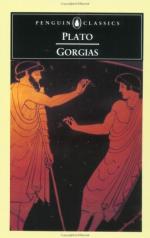
|
| Name: _________________________ | Period: ___________________ |
This test consists of 15 multiple choice questions and 5 short answer questions.
Multiple Choice Questions
1. Why does Socrates hold rhetoricians in low esteem?
(a) He failed as a rhetorician.
(b) He believes that they are evil.
(c) He believes that their influences is insignificant.
(d) He believes that they are careless.
2. According to Socrates, what is the key ingredient in determining who a person becomes?
(a) How they are raised.
(b) How much money they have.
(c) What evil they are exposed to.
(d) What they know.
3. What does Gorgias intend to use rhetoric for?
(a) To educate.
(b) To manipulate a crowd.
(c) To speak and comprehend.
(d) To frighten criminals.
4. What are Socrates' criteria in analyzing sciences?
(a) Based on their fidelity to tradition.
(b) Based on their organized presentation.
(c) Based on their benefit to humans.
(d) Based on their creative angle.
5. How does rhetoric benefit politicians in Gorgias' musings on politics?
(a) It makes them seem more appealing because of their easygoing attitude.
(b) It makes them seem compassionate.
(c) It entertains youth and gains their support.
(d) In their persuasive abilities, they can gain support.
6. Why does Socrates regard Gorgias' answers as useful?
(a) Because he is well educated.
(b) Because they are precise.
(c) Because they are unique.
(d) Because he understands rhetoric now.
7. Socrates regards rhetoric as a skill that elicits what?
(a) Gratification.
(b) Anger.
(c) Grandiosity.
(d) Knowledge.
8. What subjects does Socrates specify rhetoricians have the ability to speak about?
(a) Politics.
(b) Emotions.
(c) All subjects.
(d) Science.
9. What does Gorgias believe rhetoric can be used for?
(a) Getting out of trouble.
(b) Curing disease.
(c) Gaining sympathy.
(d) Persuading authorities.
10. What does Socrates define tyranny as the power to do?
(a) Evil.
(b) Anything one pleases.
(c) Good.
(d) Nothing.
11. According to Socrates, what do politics preside over?
(a) Soul.
(b) Beliefs.
(c) Emotions.
(d) Body.
12. What description of rhetoric is Gorgias supposed to provide?
(a) Objective.
(b) Promotional.
(c) Professional.
(d) Exaggerated.
13. In Socrates' philosophy, in an unjust act, who feels greater evil?
(a) The one who suffers injustice.
(b) Society as a whole.
(c) The one who commits injustice.
(d) The family of the victim.
14. Gorgias describes good rhetoric as delivering a response in what way?
(a) Excitedly.
(b) Creatively.
(c) Precisely.
(d) Critically.
15. Why does Socrates have a low regard for Sophists?
(a) They have little influence.
(b) They are not concerned with justice.
(c) They are too afraid of knowledge.
(d) They actively harm.
Short Answer Questions
1. How does Socrates believe the consequences of an ugly action should be measured by?
2. The discussion of rhetoric raises matters of moral, philosophical, and what type of concern?
3. What kind of people does Socrates believe rhetoric can influence?
4. When does Socrates regard pain as useful?
5. Socrates regards flattery is the main point used on what area?
|
This section contains 456 words (approx. 2 pages at 300 words per page) |

|




